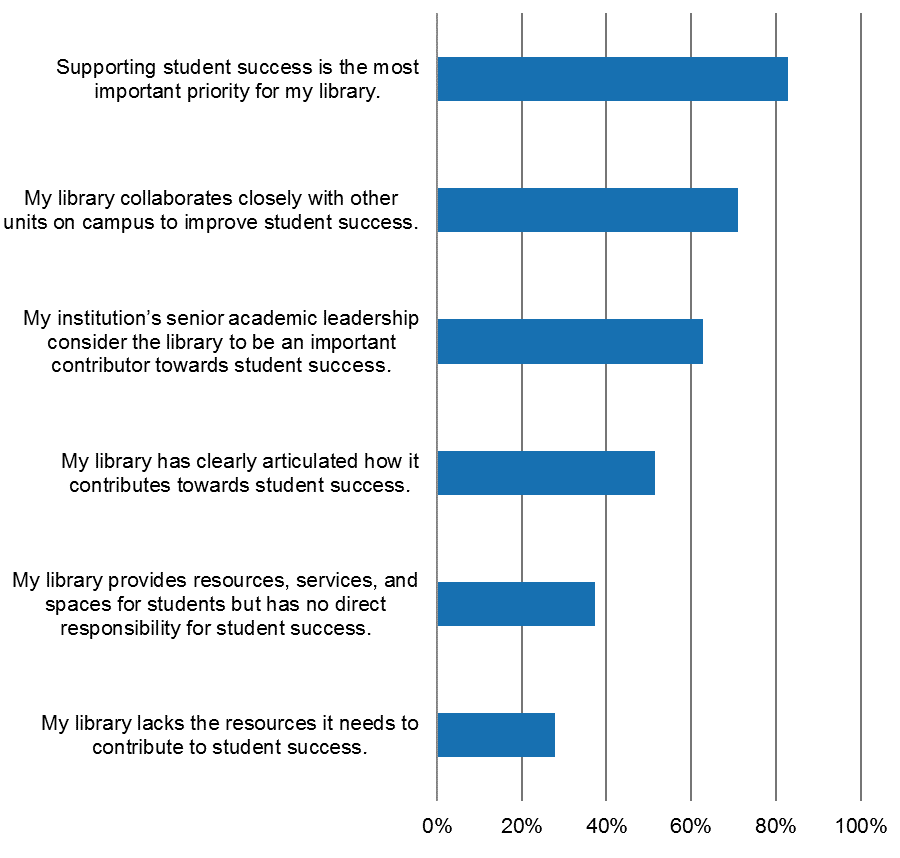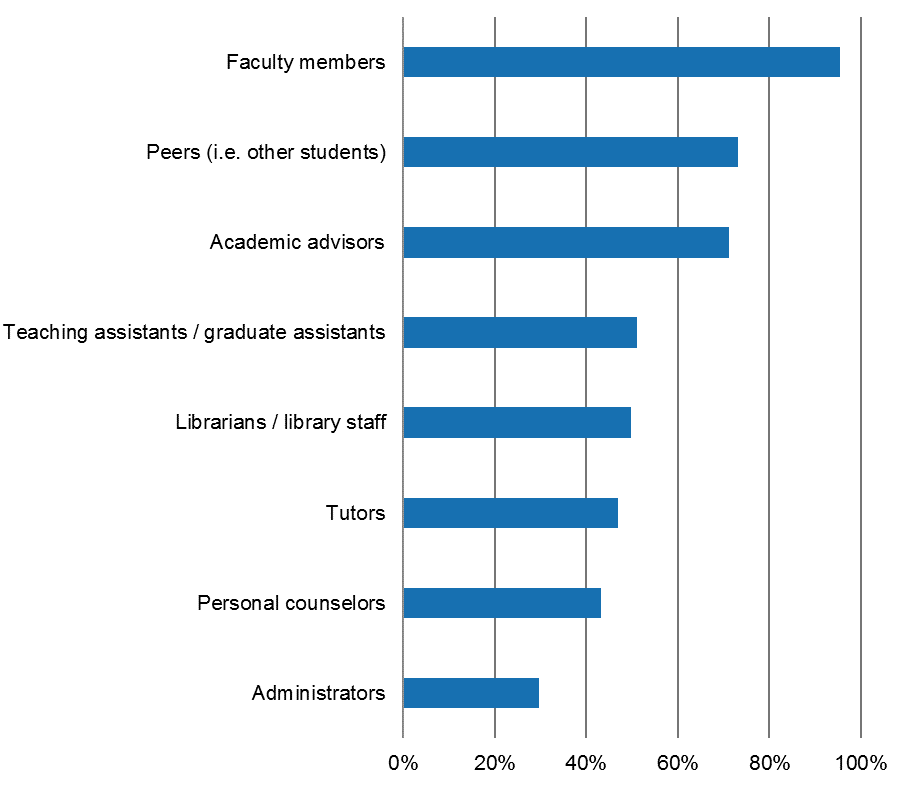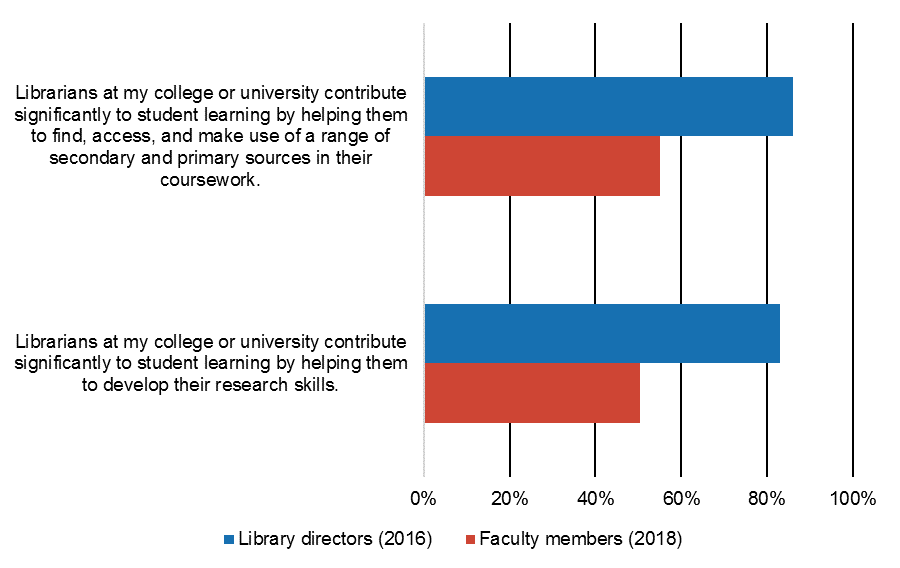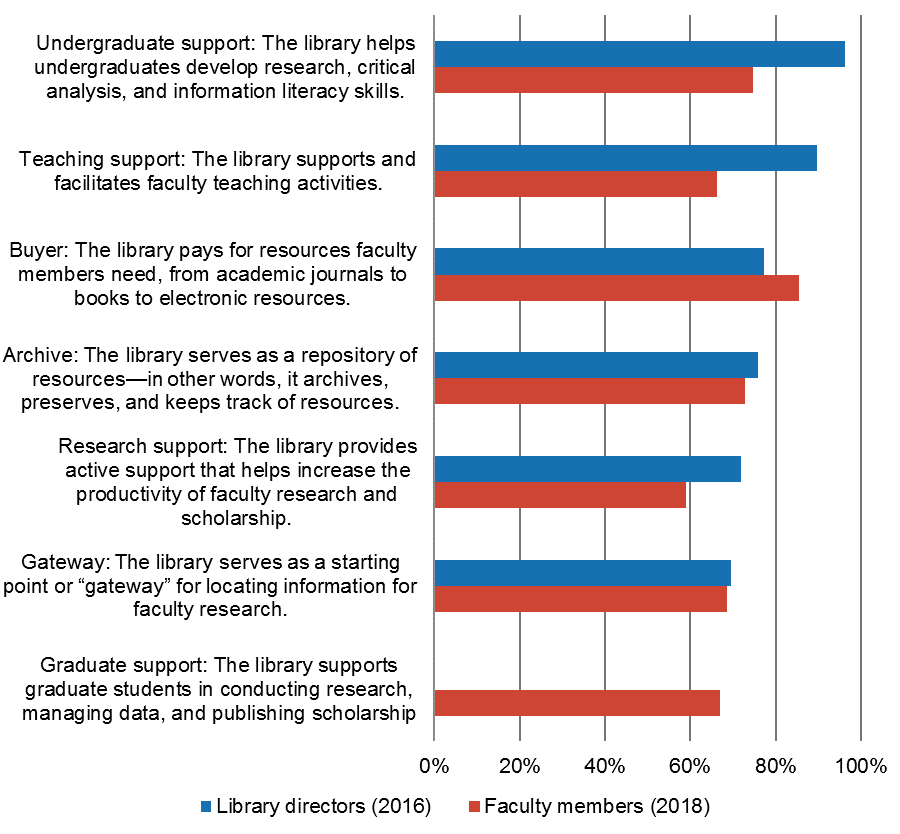Who is Supporting Student Success? A Faculty Perspective
In the course of their higher education career, students come into contact with faculty members, librarians, advisors, other students, and many others at their college or university who aim to help them achieve their academic and personal goals. Definitions of “student success” can vary widely and be attributed to a variety of institutional and non-institutional contributors and factors. Who most significantly contributes to this success from a faculty perspective? Where does the library fit into this picture? And, how do the perspectives of library deans and directors diverge from those of faculty members?
Back in 2016, Ithaka S+R conducted the third cycle of our US Library Survey, which included 722 responses from library leaders at four-year institutions across the country. The survey examined various organizational topics including the role of library leadership, alignment between the library and its institution, budgeting and staffing, library contributions to student success, and more. The US Faculty Survey 2018, fielded last fall, included 10,919 responses from faculty members and investigated research and teaching practices, as well as how faculty perceive the role of the library. These questions specifically regarding the library are asked of both library directors and faculty members in each survey, affording us the ability to draw comparisons across samples.
Who is Supporting Student Success?
Library directors, naturally, have particularly positive views concerning their role in contributing to student success at their institution. Approximately 83 percent of respondents indicated that supporting student success is the most important priority for their library, and 63 percent indicated their institution’s senior academic leadership consider the library to be an important contributor towards student success (see Figure 1). About seven in ten library directors strongly agree that they collaborate closely with other units on campus to improve student success. However, only roughly half strongly agree that their library has clearly articulated its contributions towards this aim.
Figure 1: Please use the 10 to 1 scales to indicate how well each statement below describes your point of view. Percent of respondents that strongly agreed with each item.
For a number of survey cycles, we have noted gaps in how faculty and library directors perceive the role of the library. To gain additional insight, we added questions to the 2018 cycle of the US Faculty Survey, asking how important or unimportant particular roles are in contributing to student success.
Perhaps unsurprisingly, faculty members perceive themselves as the most important in contributing to student success; 95 percent of respondents named faculty as highly important, followed by peers (i.e. other students), academic advisors, teaching/graduate assistants, and librarians/library staff (see Figure 2). Approximately half of faculty rated librarians and library staff as highly important in contributing to student success.
Figure 2: How important or unimportant are each of the following in contributing to student success at your college or university? Percent of respondents that indicated each of the following as highly important.
What is the Library’s Contribution to Student Success?
When asked about specific contributions towards student success, 80 percent of library deans and directors strongly agreed that librarians significantly contribute to student learning by helping them develop their research skills and to find, access, and make use of a range of secondary and primary resources (see Figure 3). Faculty members are less likely to credit the library for these contributions: roughly half of faculty respondents strongly agree with these sentiments.
Figure 3: Please use the 10 to 1 scales to indicate how well each statement below describes your point of view. Percent of respondents that strongly agreed with each item.
These attitudinal differences concerning the role of librarians in their support of students are further evidenced by responses to one of our longest standing questions across both surveys where we ask respondents to rate the various roles and functions of the library. We’ve been using this question within the library survey since 2010 and with faculty since 2003.
A large share of library directors have indicated the undergraduate and teaching support roles of the library as its most important functions (see Figure 4). Notably, library directors rate all of the service-oriented roles higher than faculty respondents. Conversely, faculty members think that the library’s most important function is purchasing needed scholarly resources.
Figure 4: How important is it to you that your college or university library provides each of the following functions below, or serves in the capacity listed below? Percent of respondents that indicated each item as highly important.
Library leaders feel their most important role is to support undergraduate learning and faculty teaching, whereas faculty see the importance of the library as an archive, buyer, and supplier of materials. Given that only half of library directors indicate that their library has clearly articulated how it contributes towards student success, it is perhaps understandable that their contributions do not uniformly translate to faculty members.
The perception gaps identified in previous survey cycles and further illustrated in our most recent survey cycle have us continuing to consider how libraries can both (1) better support students and (2) better demonstrate their contributions. In the upcoming US Library Survey 2019, to be fielded this fall, we will continue to explore these questions and present an updated snapshot of library leader perspectives on their role in supporting student success.



